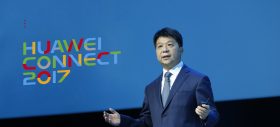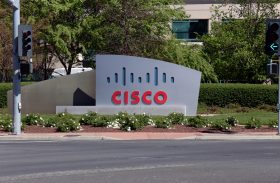Huawei Wants to Be One of 'Five Clouds'
SHANGHAI -- Everybody wants a piece of the cloud. Why should Chinese technology giant Huawei be any different? Here at its Huawei Connect conference, the company announced initiatives to expand its public and private cloud services to enterprises.
Cloud is the next opportunity, as Huawei has set a goal to become one of the "five clouds," according to Guo Ping, Deputy Chairman of the Board and one of Huawei's rotating CEOs.
Ping described the five clouds, as Huawei calls them, in a twist on the off-repeated quote of IBM Thomas Watson, who said in 1945 that "there is a world market for about five computers."
"This statement turned into a laughing stock of the industry," said Ping. "...but maybe it's not five computers but five clouds."
Huawei's Cloud War
A Huawei spokesperson said the five clouds refer to Huawei's market presence. Some of the top cloud providers currently include Amazon.com, Google, IBM, Microsoft, Oracle, and Salesforce.com, so Huawei is presumably talking about cracking into this cadre of leading cloud providers. Maybe it wants to make Bob Evans's "Cloud Wars" list.
Competitors should pay attention. Cisco executives once scoffed at the notion that Huawei, once thought of as a networking gear copycat, would surpass the American networking giant. But Huawei did that many years ago. It's one of the fastest growing technology companies in the world, with $80 billion in revenue in 2016, up from $30 billion just five years ago (Cisco, in comparison, does $50 billion with zero growth).
Huawei's strength is in what it calls ICT (information and communications technology), particularly networks and mobile technology. But the company has been patching together a cloud strategy with its FusionSphere virtualization technology, Internet of Things (IoT) platforms, networking platforms, and heavy investment in artificial intelligence (AI). The company is one of the top spenders in R&D in the world, with $11.6 billion in 2016 -- almost 15 percent of its total revenue.
Huawei has a twist in comparison with public cloud services such as Amazon or Microsoft. It's positioning itself as a communications specialist that can host private cloud applications, as well as AI, while securing the data and applications. Huawei executives here say the company will not touch applications or data themselves. It merely wants to serve as the infrastructure of the cloud.
In examples presented on the keynote onstage, Huawei showed how partners such as the DT, Orange, Telefonica, Industrial and Commercial Bank of China (ICBC), and VW are using Huawei cloud offerings to generate a return on investment and increase efficiency.
Seeking Cloud ROI
Sheng Yelai, president of Hauwei Cloud Business Unit, pointed to VW's 28 percent savings in running its e-commerce cloud with Huawei. He also cited 70 percent savings and a 30 percent increase in business performance at ICBC.
Yelai said Huawei will focus on three principles to make Huawei cloud grow: 1) Data security and privacy, 2) Reliability and stability, and 3) Being trustworthy.
For Western customers, the trustworthy issue may rank as the challenge, especially in the United States where its communications equipment is sometimes looked upon skeptically because of perceived links to the Chinese government. Huawei executives seemed aware of this, as they made many statements emphasizing the data security, privacy issues, and the "sovereign" nature of its cloud.
On the show floor here, Huawei demonstrated its considerable breadth of product, ranging from consumer devices such as popular Honor mobile phones to cloud products, networking infrastructure, Internet of Things (IoT) platforms, and comprehensive smart-city platforms that integrate large numbers of data sources including video surveillance.
The Cloud Brain
A theme running through many of Huawei's presentations is about becoming the "brain" by using artificial intelligence (AI) capabilities in the cloud. There's the Agile Controller, a "brain" for networks, as well as the Shenzhen Traffic Brain used to monitor city traffic, introduced here by Huawei and the Shenzhen Traffic Bureau.
Ping seemed to have no doubts about what Huawei will accomplish in the cloud.
"We will make an all-out effort to build the Huawei cloud, including the public cloud. We are making the commitment and the partners that we have made strategic investments to public cloud," said Ping. "Cloud is the most needed technology of governments and enterprises. Huawei is making strong investments for cloud platforms."
Let the Cloud Wars continue. Huawei's entrance will only make it more interesting.
The Futuriom Ultimate Industrial Internet of Things (IIoT) Report covers a wide range of communications and cloud technologies that are being applied to businesses around the world to provide connectivity, analysis, automation, and optimization of a range of industrial applications. For Futuriom community members, we are offering a special discount on a one-user license to this report for 20% off, which means you pay only $760! Go to the report page and use discount code "EDGE" for purchase.













